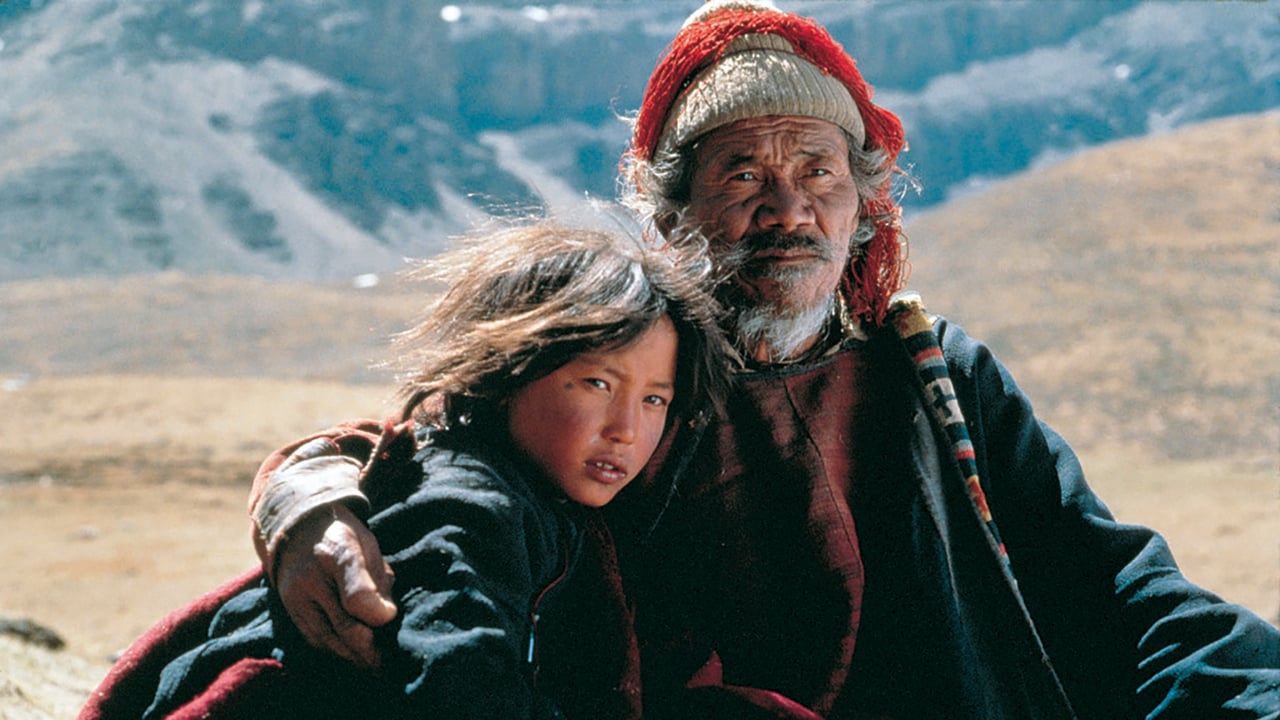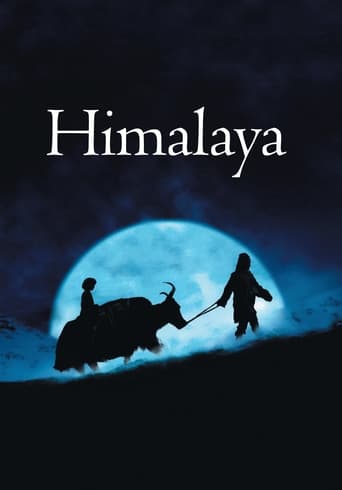Actuakers
One of my all time favorites.
Tyreece Hulme
One of the best movies of the year! Incredible from the beginning to the end.
Brenda
The plot isn't so bad, but the pace of storytelling is too slow which makes people bored. Certain moments are so obvious and unnecessary for the main plot. I would've fast-forwarded those moments if it was an online streaming. The ending looks like implying a sequel, not sure if this movie will get one
ccasey-1
If you believe film should be an artform, then you'll love Himalaya. As the director states in the bonus audio track, the production team did not identify and write to a "target market" when developing the screen writing, they did not follow the dreary Hollywood "recipe" for film-making, and, most importantly, they did use non-actors to portray almost all the lead and back-up roles. Tinle, the lead character, is a treasure. The first time I viewed the movie, I thought, 'what a wonderful actor.' His timing is exact yet unpredictable, his personality forceful, his face is exquisite, his form unique and authentic. A natural, I thought. Indeed, he plays himself in a quasi-autobiography, and what a wonderful character he is.This is a movie about an ancient civilization we are losing and, sadly, will soon be lost. Really, its a documentary, and, as the director states, will certainly be used by future historians as a visual artifact of what is soon to become the lost Dolpo civilization of Nepal. The soundtrack conditions you to this heartbreaking reality.The movie is successful on many levels: a mother's lost love (who hasn't seen her adult child since he was eight); a loving grandfather/grandson relationship, which is painfully lost; a wife who loses her husband, and a young boy who loses his father then attempts to make sense out of the loss; a young religious man who chooses the 'difficult' path over the easy monastic life; a classic confrontation between generations; and an old man whose entire life is built on strength, perseverance, and admiration, but then who ultimately must let go of it all to those who are destined to succeed him.I loved this movie. It made me think of my mother, an artist, whom I miss dearly. Himalaya is a work of art.
George Parker
"Himalaya" is about as exotic as films get. Using indigenous people in a remote and harsh corner of Nepal (Dolpa), an adventurous French director (Valli) created a film about a superstitious and aging tribal chief who leads a caravan of Yaks through hazardous Himalayan reaches to trade salt for the grain required to sustain his people. The film is interesting inasmuch as it uses native nonactors in an extremely remote region of great beauty which is seldom seen up close and personal. The result, however, is not great drama and the scenics, though beautiful, are less breathtaking than I had expected. In fact, I found the "The Making Of..." featurette on board the DVD more interesting than the film itself. Considering the low entertainment yield of this ambitious project, it would probably have worked better as a documentary or travelogue. Nonetheless, this exotic-for-the-sake-of-exotica film should be much appreciated by those into films about foreign cultures or with a special interest in the Nepali. (B)
arch29
~Some spoilers~It stands as a sweet, poignant story of a simple life of hardship, strife, and the necessity of growing up and enduring. Against a backdrop of superstition vs. pragmatism, a village elder's [Tinle's] hatred and need for revenge stem from the death of his first son -- a death he blames on the son [Karma] of another family whose ancestors had bad blood with him and his own. In his stubbornness, he consults the star charts for guidance on when depart on a caravan through the mountains to trade their livelihood (salt), rather than following the urging of Karma, who departs with most of the young men of the village 4 days before him in an effort to avoid late season storms. Tinle asks his second son -- a lama who knows only how to paint and pray -- to help the rest of them voyage over the mountain pass to trade for their livelihood. Initially refusing, the priest later reconsiders, remembering something he was once taught: "when presented with two paths, always choose the harder one". This speaks to me of the value of life as a journey rather than a destination: the value of striving and failure (even it does seem ludicrously impractical as *general* advice).Though some of the members of the second caravan are too old or too young to make the journey, stubbornness and need drive Tinle onward, even through a treacherous shortcut through a winding trail high above a mountain lake, as well as stormy snowdrifts in a high mountain pass. Tinle's grandson [Passang?], orphaned now and destined to be the chief in the future, learns much from his mother and Tinle before and during the journey. He takes comfort in the knowledge of the afterlife, that lives are ended and reborn in an eternal cycle. This story, while to me not a tragedy, has a similar fiery cleansing effect because it presents life with such purity and urgency -- that of an ancient legacy. There is need and striving, pain and endurance, and compassion. Most of all, there is reconciliation and epiphany: Tinle breaks his circle of hatred and manages to forgive before he dies, finally coming to terms with his grief and putting the good of the tribe ahead of need to blame someone for his son's death. He is healed. Karma, having never really returned Tinle's spite, learns that there may be more to the superstitious old ways than meets the eye: sometimes there are hidden merits to tradition, even though they seem pointless on the surface.The most memorable moments are at the end of the film. When Tinle collapses, his life spent, Karma says, "I've sometimes dreamt that you were my father." It's touching that his shield of love never let him be deeply wounded by Tinle's long-standing grudge and unrelenting hatred. And Tinle reconciles, showing that his eyes are open, at last, with true insight: "You're too much like me to be my son. A real chief always starts by disobeying." This speaks to me of the need for a strong will, but more: the need to learn through failure.Karma says, "We're almost there. We can't part now that we've just met". Indeed, they truly have just met, in a heartfelt, significant way. Finally, Tinle says, "We've always been together. We wanted the same thing": such simple words, but so appropriate and regal.When Tinle dies, his very young grandson Passang seems to accept it, saying, "Let him go. He's going to find my father in Padmasambhava's paradise." Is this not a powerful testimony to our urgent need to believe in an afterlife? -- if not just to comfort ourselves, but also our children when they confront the reality of death for the first time -- knowing that lives don't just end pointlessly, the valued soul lost forever to oblivion. But rather that the spirit lives on and is treasured by the world, or by someone who cares.The film's epilogue is symbolic of the main story: The embracing wings of the birds and the sheltering boughs of the trees, which are finally seen for the first time at the end of the journey, symbolize paradise and redemption. And we, the pinnacle of evolution, are left to try to make sense of it all -- to serve the rest of the living world -- perhaps to only rationalize our existence, such as through prayer and painting -- and to mimic and harvest from the land of our birth.It's a soul-wrenching, beautiful agony to experience this film, with its touching and appropriate music, and its painted fresco at the end that celebrates the tapestry of lives spent in strife, loyalty, and perseverance. It's the story of the most formative journey in a leader's childhood, immortalized and revered.
artzau
One reviewer asks if we (Westerners) can ever see the world through another's (non-Westerner) eyes. Good question. There's no 'yes' or 'no' answer because we can't get into people's heads. The cultural viewpoint from the standpoint of the actor in the cultural setting is always different from the outsider. As intruders into that world, we can observe, wonder and learn. Yes, indeed like voyeurs, my friend but these are not "primitive" people. These are people who have adapted to a way of life and developed means of coping with it. Since many of these people live isolated lives, the cultural diffusion of technology invades their worlds slowly. (We anthropologists see this fact as a mercy) This film is a wonder. As one reviewer asks, can we watch a film for over a 100 minutes of people walking? It depends. What do you want? Adventure? Rent a Hollywood spawn with phony chases, lots of CGI and god-awful writing. This is a simple story but one basic to the human condition. Loss, death, coming of age, transition, love and resurrection. This film is full of archetypes but without the contrived devices found in so many Western films. The adventure is that of the daily lives of these people who live always on the edge. It is most unfair to judge this simple tale and its depiction from the same viewpoint of another mythic journey. There's only the violence of nature and the triumph of human will to survive-- not happily ever after, but just for another day. As an anthropologist who spent over 25 years working with pastoralists (nomadic herders) in Africa, Central Asia, South America and the Middle East, I was delighted with this unpretentious story. I never worked with yak or reindeer [I highly recommend the exceptional "Pathfinder" for an excellent view of the Lapps]herders and the presentation certainly squared with everything I've read about these dynamic, wonderful people.

